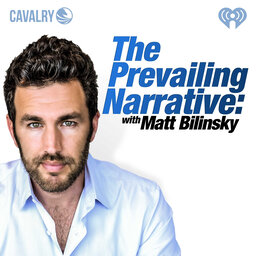Episode 30: "Dark Plots & Secret Explanations": Study Rejects "Chemical Imbalance" as Cause of Depression (Max Lugavere Discusses); Biden & His Media Surrogates Re-Define "Recession; Kansas Abortion Ruling; Zelensky Poses for Vogue(?!); Public Health Lies on Monkeypox
0:12 - Intro: The establishment continues to lose trust....because the establishment continues to be proven WRONG - as Mic Solana's piece "Dark Plots & Secret Explanations" eloquently demonstrates.
11:01 - Big Tech, the "Fact Checkers" and media outlets all spring into action to support Biden's claim that a "Recession" really isn't 2 consecutive quarters of negative GDP (and other similar fabrications)
30:56 - A win for Pro-Choice as Kansas voters (including conservative ones) reject referendum that would clear the path to a full abortion ban
39:55 - Ukraine's President Zelensky poses for a Vogue photoshoot...despite Russia's continued progress against him on the battlefield. Summary of the current state of the Russia-Ukraine conflict.
53:52 - 3 states declare State of Emergency on Monkeypox....but public health struggles on messaging to avoid "stigmatizing" high risk groups (in other words, more bullshit).
1:06:11 - Wellness expert Max Lugavere on a shocking recent study casting doubt on "chemical imbalance" as the cause of depression, and the (over) prescription of anti-depressants as the solution.
In 1 playlist(s)
The Prevailing Narrative with Matt Bilinsky
A lively and fiercely analytical breakdown of news and current events, with interviews of thought le…Follow podcast
Recent clips

Episode 29: Kamal Ravikant - Silicon Valley Thought-Leader, Investor, & Bestselling Author on Loving Yourself, Stepping Past Fear, Extreme Sharing, Investing Skills, and Living a Life of Honesty, Adventure and Authenticity
1:12:12

Episode 28: Political Scientist Wilfred Reilly on Gun Control, Targeted Solutions, and the Facts and Myths About Gun Violence in America; Nihilism and Mass Shootings
1:44:29

Episode 27: Soros DA Chesa Boudin Gets Bounced; Washington Post Descends Into Chaos; Russia Update and Gas Prices Hit Record High; Peter Navarro Arrested & Man Tries to Assassinate Justice Kavanaugh
47:41
 The Prevailing Narrative with Matt Bilinsky
The Prevailing Narrative with Matt Bilinsky